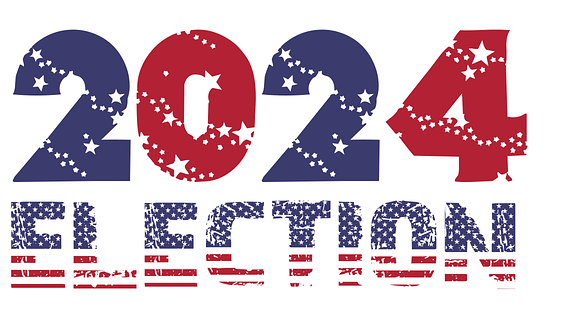What decides an election?
The answer usually comes down to a complex web of many factors.
However, the strongest threads of that web, which usually end up being the deciding factors, are the swing voter and the core voter’s turnout.
Swing voters are typically independents and moderate Democrats and Republicans but can be anyone who has voted across party lines.
They are voters whose past voting record is inconsistent, meaning they’ve voted for different or multiple parties at some point.
Core party voters are those who vote only for their party and have a consistent voting record of doing so.
These are so important because if they don’t turn out for their party, the party may lose an election because members of their voting base decide to stay home.
However, what influences these voters and their ultimate electoral decision usually comes down to specific issues of the given year.
These issues may swing voters to one side or another and galvanize or demoralize a party base.
Here, we’ll examine four issues that directly affect the 2024 presidential candidates and are looming over their campaigns.
These issues could, together or independently, turn the election in favor of either candidate.
Issues that we’ve already talked about, like immigration, won’t be on this list, and another, abortion, will be getting its own article in the future.
However, with that said, here are 4 issues looming over the 2024 presidential candidates as we inch closer to the general election.

1. Joe Biden and Uncommitted Voters
We’ll start with an issue that, for the most part, is coming from the Democratic party’s core voters.
That is, the voters voting uncommitted in the Democratic primary election in protest of Joe Biden’s policies toward the Israel-Hamas War.
It all started in February with the Michigan presidential primary. More than 100,000 people voted uncommitted, compared to around 20,000 in normal years.
Overall, Biden won the state election with about 81% of the vote, but those 100,000 votes accounted for a little over 13% of the total Democratic vote in Michigan.
The uncommitted voters were directly protesting Joe Biden’s handling of the Israel-Hamas War and calling for him to support a total ceasefire.
Many were also calling for the United States to stop sending aid to Israel and that if Joe Biden doesn’t change his approach to the Israel-Hamas, they won’t vote for him in November.
This movement was supported by Rashida Tlaib, a congresswoman from Michigan who is a member of the Congressional Progressive Caucus and the Squad, the far-left caucus and furthest left group in the House of Representatives we talked about in the last article, A House Divided.
This movement continued into other states’ primaries like Wisconsin, Minnesota, and Washington.
All these voters and supporters aim to make Joe Biden feel at risk of losing these potential states in the general election in November and, therefore, the presidency.
And this should be a significant concern for Biden.
In 2016, Donald Trump beat Hillary Clinton in Michigan by about 10,000 votes. In 2020, Biden beat Trump by around 150,000 votes in Michigan.
So, if the race is close and these 80,000-100,000 uncommitted voters don’t vote for Joe Biden, the swing state of Michigan could go to Donald Trump again, who could win the presidency because of it.
Imagine a scenario where Biden wins his core states and other swing states like Pennsylvania but loses the election because he lost the other swing states of Michigan and Wisconsin by 10,000-20,000 votes in those states.
That’s the pressure the uncommitted movement wants Biden to feel, and it’s a real-life possibility because these voters have stated they will not vote for Biden in November if he doesn’t change his policies.
If this does happen, however, it will be a perfect example of someone cutting off their nose to spite their face.
It’s one of the most shortsighted positions you could take if your goal is to stop the situation in Gaza.
If the uncommitted voters think Biden’s policies are wrong, they will pale in comparison to what Donald Trump’s policies will be.
By not voting for Biden, they would make the most essential issue to them much worse, and they would be directly responsible.
Many uncommitted voters strongly oppose Benjamin Netanyahu’s policies as Israel’s prime minister. Still, they forget or don’t know that Trump and Netanyahu had a very close relationship and saw many of these issues eye to eye.
For example, Trump moved the U.S. embassy in Israel from Tel Aviv to Jerusalem during his presidency, a move long wanted by Netanyahu that extremely angered Palestinians.
Trump also supported Israel’s expansion into the West Bank.
This support of expansion reversed 40 years of American policies that called Israel’s West Bank expansion settlements illegal. Expansion ultimately didn’t happen because of the Abraham Accords, but because of Trump, Netanyahu was emboldened to do it.
All this was before the Israel-Hamas War.
If Trump was in lockstep with Netanyahu then, what would his policies look like now in wartime?
Uncommitted voters don’t seem to understand this and don’t realize their position will hurt their cause the most. They also don’t understand the geopolitical situation in totality and the many other factors Biden needs to consider.
The protests also haven’t resulted in much of the change they want either.
The only change seems to be that the Biden administration is now wording the call for a ceasefire as a “temporary ceasefire” instead of a “humanitarian pause,” but in terms of policy, they are the same thing.
But the question moving forward for the election is, will these voters feel this way in November?
Will they realize they will cut off their nose to spite their face, or will they continue to be shortsighted?
2. Donald Trump and Electability
While Biden is worrying about certain voters potentially not voting for him, Donald Trump is in the same predicament; however, for him, it’s a matter of swing voters.
One of the ironic circumstances of Donald Trump saying the election in 2020 was stolen is that those claims may hurt him the most in this year’s coming election.
This is not just because many swing voters may be sick and tired of that narrative without sufficient evidence or logic but because it doesn’t allow for any realistic analysis of why Trump won in 2016 and lost in 2020.
However, some of that analysis shows one thing in particular: Trump is pushing voters away.
The argument can be made that in 2016, Trump was the more moderate candidate.
Trump appealed to many independent and moderate voters at the time.
And while the Republican party initially did everything it could to prevent Trump from being their nominee, Trump eventually prevailed, and the party coalesced around him.
With the Republican party’s core behind him and the support of many independent and moderate swing voters, Trump won states like Michigan, Pennsylvania, and Wisconsin.
These swing states had been a part of the Democrat’s Blue Wall since 1992.
The Blue Wall was a grouping of 18 states, along with Washington D.C., that voted for a Democrat for president since the 1992 election.
However, all three states switched back to Joe Biden in 2020.
Why? Because Donald Trump and candidates like him in other elections around the country are too polarizing to the far right, and that pushes people away.
Trump’s presidency reflected this, and it was very chaotic and tumultuous.
This culminated with January 6th, and by the end, many independent, moderate, and swing voters had had enough.
However, Trump has not changed his approach to his campaign for the 2024 presidential election.
He continues to double down on his base and his far-right policies instead of trying to reach out to these independent, moderate, and swing voters.
He continues pushing the narrative that the 2020 election was stolen instead of trying to understand why he lost in 2020.
This is also now directly affecting the Republican party, and the never-Trump wing of the party seems to be in full swing again despite what Trump is saying.
In February, after Trump won the primary in South Carolina, he said, “I have never seen the Republican Party so unified as it is right now.”
But juxtaposed to that, literally right at the bottom of the screen, were the primary numbers showing Nikki Haley with almost 40% of the vote. Trump also lost the state of Vermont and the District of Columbia outright to Nikki Haley.
For historical reference, in the 1984 Republican primary, Ronald Reagan won almost 99% of the Republican vote in the country.
Clearly, Donald Trump is lying, or he just doesn’t understand what the word unified means.
Taking this one step further, in the Kansas Republican primary on March 19th, almost two weeks after she dropped out of the race, Nikki Haley received a little over 15,000 votes, a bit more than 16% of the vote.
Mind you, Kansas is a closed primary state, meaning only registered Republicans can vote in the Republican primary.
As discussed in the last section, if 13% is a problem for Joe Biden, a similar number nationwide for Trump would do the same thing.
However, in this case, these voters could flip and vote for Biden instead of just not voting as in the uncommitted situation.
Sure, some of these Republicans will come home and vote Republican regardless, but many Nikki Haley voters will not vote for Trump.
Yet he continues to double down on his base and push away a significant portion of the Republican party, which, at this point, will probably never vote for him.
Combine this with independent and other swing voters he has and is pushing away, and you have a recipe for someone who may be unelectable.

3. Joe Biden and the Economy
If there is one issue on which Donald Trump may be able to gain some ground, however, it’s the economy.
Regardless of whether it’s fair or not, the president usually gets credit or blame for the state of the economy.
I say fair because the economy is a lot more complicated than just who the president is. However, in the realm of public opinion and politics, the president is always responsible.
And the problem for Joe Biden is that Americans feel the economy isn’t working for them.
If this continues into November, it could be a way for Trump to actually bring in the swing voters we discussed in the last section.
Inflation is still the main factor in the economy. It was and is painful for many people despite the fact that it has come down quite a bit.
Inflation is built into our economy, as we’ve seen built-in price growth over the past years. These stable high prices are really felt by many people in many different areas of the economy.
However, except for inflation, the United States economy, on paper, looks pretty good.
Unemployment is low, and GDP is strong.
There was no recession, as some predicted. The stock market is growing, and the economy overall is growing.
Joe Biden needs to lean into this. He needs to tout the strong GDP and low unemployment numbers while focusing on how inflation has come down, his contributions, and his plan to help fix what Americans are feeling.
Because people do not feel these on paper numbers, they feel price shock when they go to the store or buy car insurance.
And if people still don’t feel the change by November or don’t pay attention to or care about the on-paper numbers of GDP, unemployment, and the stock market, some voters may swing for Trump.
However, Trump will still have to capitalize on this.
Trump stated that the boom in the stock market earlier this year was due to anticipation of his winning the election in November. This is probably not the best argument and not a good start in his efforts to convince discerning swing voters.
Regardless, since the president is always connected to the state of the economy, economic conditions in November could very well decide Biden’s fate in the election.
4. Donald Trump and the Hush Money Trial
For the first time in the United States history, a president is facing a criminal trial, and regardless of the outcome, it will strongly influence Trump’s campaign and the 2024 election.
In a quick summary, Donald Trump is facing criminal charges about a payment of 130,000 dollars made to porn star Stormy Daniels before the 2016 election to keep her quiet about a potential affair she had with Trump in 2006.
Hush money payments, as they are called, are not illegal, but Trump is being charged with fraud under campaign finance laws for allegedly falsifying his business records by saying that the money was for legal fees.
Trump is also facing criminal trials in three other cases, but since these cases don’t seem likely to be taken to trial until after the election in November, this trial is put into a much sharper focus.
This will influence the election and Trump’s campaign on many different levels.
If Trump is convicted, he could potentially go to prison, but the judge could also sentence him to probation.
However, even if sentenced to prison time, he will probably be out on bail awaiting appeals.
The prospect of him potentially going to prison and the logistics of him running for president or even being president from prison are crazy hypotheticals to think about.
However, this would probably not happen because of the appeals mentioned above. The legal process can take a long time, and the appeals would likely go on for a while and push everything past election day.
If convicted, the damage will most likely come from voters who now have to decide whether to support a convicted felon.
Many voters, including many Republicans, have said they would not vote for a convinced felon, so the trial could have the most significant impact at the ballot box and contribute to the electability problem we discussed in point two.
Also, the entire process will take away from Trump’s campaign in terms of time and money.
He will have to spend weeks in a courtroom, which will take him away from the campaign trail. He will also have to spend a lot of money on legal fees instead of on his campaign.
But it’s not all bad for Trump, as the trial feeds into his narrative of being persecuted by the Democrats and Joe Biden.
Trump’s narrative that all of this is election interference will be strengthened by the fact that his base will see him sitting in a courtroom every day.
But regardless of the outcome, fuel will be added to this narrative no matter what.
If convicted, it will probably be more proof to the base that Trump is a victim and everyone is corrupt and a fraud.
If acquitted, it will probably be more proof that Trump is innocent of everything and everyone is corrupt and a fraud.
However, as we’ve repeatedly asked in this article, how will this affect the swing voters?
A conviction will probably hurt Trump, as mentioned, with many people who won’t vote for a convicted felon. Also, the trial will probably remind people of Trump’s character and bring up memories of four years ago.
But needless to say, the trial, all the other issues we’ve discussed, and the reactions of the swing and core voters will be significant threads in the web that will decide the election.
Along with other important issues, the impact of each will decide the final political web and what our country will ultimately look like after the election.
